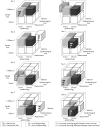A framework to analyse gender bias in epidemiological research
- PMID: 18000118
- PMCID: PMC2465769
- DOI: 10.1136/jech.2007.062034
A framework to analyse gender bias in epidemiological research
Abstract
The design and analysis of research may cause systematic gender dependent errors to be produced in results because of gender insensitivity or androcentrism. Gender bias in research could be defined as a systematically erroneous gender dependent approach related to social construct, which incorrectly regards women and men as similar/different. Most gender bias can be found in the context of discovery (development of hypotheses), but it has also been found in the context of justification (methodological process), which must be improved. In fact, one of the main effects of gender bias in research is partial or incorrect knowledge in the results, which are systematically different from the real values. This paper discusses some forms of conceptual and methodological bias that may affect women's health. It proposes a framework to analyse gender bias in the design and analysis of research carried out on women's and men's health problems, and on specific women's health issues. Using examples, the framework aims to show the different theoretical perspectives in a social or clinical research context where forms of selection, measurement and confounding bias are produced as a result of gender insensitivity. Finally, this paper underlines the importance of re-examining results so that they may be reinterpreted to produce new gender based knowledge.
References
-
- Oakley A.Experiments in knowing. Gender and method in the social sciences. Cambridge: Polity Press, 2000
-
- Lenhart Sh Gender discrimination: A health and career development problem for women physicians. J Am Med Women Assoc 199348155–159. - PubMed
-
- Harding S.The science question in feminism. New York: Cornell University Press, Ithaca, 1993
-
- Harding S.Feminism and methodology: social science issues. Bloomington, IN: Indiana University Press, 1987
-
- Harding S.Whose science, whose knowledge? New York: Cornell University Press Ithaca 1991
Publication types
MeSH terms
LinkOut - more resources
Full Text Sources

